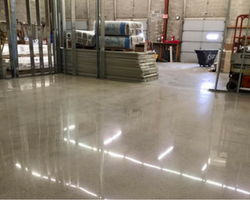
![]()
Staining concrete is a great option for finishing concrete floors. There a range of colors, designs, and looks that can be achieved by using stain. Unlike paint, you don’t have to worry about stain chipping or flaking, this is because it penetrates the concrete surface. Stain is prone to fading over time due to heavy foot traffic or exposure to weather conditions. Fading can be prevented by using a clear sealer on top of the stain. A quality sealer will not only protect and preserve stain, but it will also enhance the color of the stain, allowing the true beauty to shine.
How do you choose a sealer with there being so many options available? There are several different types out there with different advantages and limitations. The following questions will help guide you to choose the best sealer for you stained concrete project.
Can the sealer be used on stained concrete?
This seems obvious, but it is important to verify with the manufacturer of the sealer that the product can be applied to a decorative stained concrete surface. Discoloration or other unwanted effects can happen from the interaction of some sealers with certain kinds of coloring agents. Simply avoid this by double checking with the manufacturer first.
What kind of conditions is the sealer going to be exposed to?
It is important to keep in mind what type of weather, traffic, or other conditions the stained concrete will experience. If the stained concrete is the driveway or in a garage, a sealer will be needed that repels oil and grease stains, protects against water and chemical penetration, and stands up against abrasion. Exterior sealers should also allow moisture to escape from the concrete slab. A sealer that resists well to staining and scuffs is ideal for decorative concrete, such as stained concrete. It will also make the floor more easily maintained.
Can the sealer be applied inside?
When using a sealer indoors on stained concrete it is recommended to use a water-based sealer over a solvent-based sealer. This is especially true if the area is not able to be ventilated. Solvent-based sealers may contain toxic volatile organic compounds (VOCs) and they create fumes that are very flammable and that can be hazardous to inhale.
How glossy is the sealer?
A range of levels of glossiness or sheen is available from more sealers. Make sure you know what look you wish to achieve before applying a sealer. If your goal is a high gloss look like polished marble, then use a sealer that has a medium to high gloss finish. If you don’t want a lot of shine look for sealers with low gloss or matte finishes.
How long does the sealer take to dry?
There are different drying times for different types of sealers. Acrylic sealers are the fastest drying sealers setting to the touch in only 30 to 60 minutes following application. Light foot traffic is allowed in as little as 12 hours following the last coat of sealer. Epoxies and polyurethanes usually have a curing time of no less than 24 hours. Make sure to consider how soon you will need to use the floors and look into other pros and cons of the different types of sealers before choosing.
How long will the sealer last?
Typically, epoxies and urethanes are the better choice for long term use, usually lasting for years before reapplication is needed. But, how long the sealer lasts really depends on a few things. What kind of conditions will the floors be exposed to and how well are the floors maintained will be what ultimately determines the life expectancy of your sealer.
There are so many creative and custom options for finishing concrete, but first and foremost important is the concrete itself. At Custom Concrete Creations we have state of the art equipment and a properly trained team with years of experience. Custom Concrete Creations is a premier contractor serving the Omaha area as well at the Midwest. Give us a call or send us an email for your custom concrete finishing needs today!
